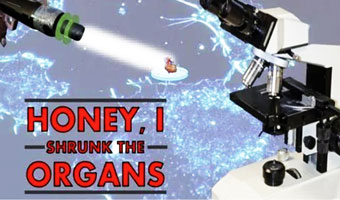
Under the cover of darkness, an Arab family left Gaza for Hadassah Hospital Ein Kerem. Little Noor would return as little Ahmed.
For four years, Ahmed mistakenly lived his life as a girl. Hadassah’s experts would fix this gender misdiagnosis, enabling the family to raise their son in synch with his biology.
“In Israel, I wouldn’t have a four-year-old patient with ambiguous genitalia,” said Dr. Guy Hidas, director of the Pediatric Urology Unit at Hadassah. Dr. Hidas works together with Prof. David Zangen, who heads Hadassah’s Department of Pediatric Endocrinology. “If a baby is born with external organs that are not completely male or female, it’s considered an emergency situation. We conduct all possible tests to make sure that baby leaves the hospital with the correct gender.”
Dr. Hidas is a specialist in disorders of sexual differentiation and corrective surgery. Since returning to Hadassah in 2014 from a three-year fellowship at the University of California in Irvine, he has performed 27 corrective surgeries. Dr. Hidas also established the Pediatric Gender Disorder and Sexual Differential Team, a multidisciplinary unit leading the field in Israel. The team includes a pediatric endocrinologist, a geneticist, a psychologist, a urologist, and a gynecologist. The specialists meet monthly to discuss patients and identify which gender is the dominant one.
Gender is determined by four factors: anatomy—the internal and external organs; endocrinology—testosterone and estrogen; genetics—the XX or XY chromosome; and psychology—gender orientation and identification.
“I will never perform a surgery unless I am a hundred percent—no, a million percent—certain that it’s the right thing to do,” says Dr. Hidas. “If I am not convinced, the surgery will wait.”
Ahmed’s external genitalia at birth looked more female, but a doctor discovered internal male genitalia when Ahmed was four. When tested at Hadassah, Ahmed’s testosterone levels and genetics supported the diagnosis of male gender.
“The secrecy surrounding gender ambiguity in the Arab sector is an added challenge to treating these patients,” explains Dr. Hidas. “Sometimes patients come to me after living with the wrong gender for years, as in Ahmed’s case, and sometimes they come to me with post-operative complications when the surgery was conducted by a physician who isn’t a specialist.
“The family was very brave in changing their child’s gender at this late age,” comments Dr. Hidas. “Ahmed is much happier now that he is living the right gender. Still, it’s not easy having a daughter one day and a son the next.”
Learn more about the Hadassah Medical Organization.









